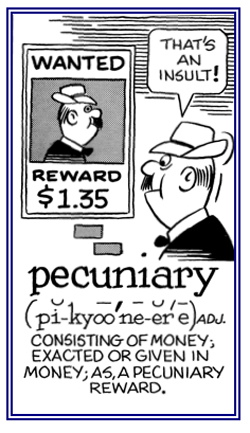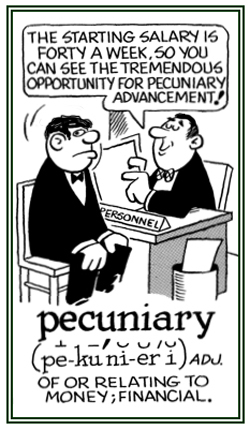-ary
(Latin: a suffix; a person who, a place where, a thing which, or pertaining to; connected with; having the character of; apparatus)
The following examples of this suffix represent a very small number of those that exist in other parts of this lexicon.
2. A bone-cave, or deposit formed largely of bones, belonging to late geological times.
3. Of or for the deposit of the bones of the dead.
2. Consisting of or referring to wealth or monetary payments: Mark's creation of the great computer program resulted in his receiving an increase of his salary as a pecuniary reward.
3. With reference to a crime, violation, etc. that involves a financial penalty: There was a pecuniary fine for Jim because he hit a parked car and drove away without getting in touch with the owner.
4. Etymology: from Latin pecuniarius, "of, or pertaining to money"; derivative of pecunia, "property, money"; from pecu(s), "cattle"; derivative of pecu, "flock" or "herd".
The historical background of "money" or pecuniary terms.
In the nomadic period of Indo-European civilization, before money in precious metal or other compact symbols was thought of, a man's wealth was reckoned in flocks and herds.
The Latin "pecus" means "cattle", and the derivative "pecunia" originally meant, "property in cattle". As civilization advanced and wealth was represented by many things other than cattle, the old word was kept with the broader new meaning.
When "money" was invented and adopted as a measurement of wealth, the word "pecunia" took on the new meaning of "money". Derived from this was the adjective "pecuniarius", "relating to or consisting of money", from which English gives us pecuniary.


Go to this Word A Day Revisited Index
so you can see more of Mickey Bach's cartoons.
Trina was sentenced to forty years in a federal penitentiary for the crime that she committed.
2. 2. In the U.S., the place of punishment in which convicts sentenced to confinement and hard labor are confined by the authority of the law: There are a number of penitentiaries located in the United States including the United States Penitentiary in Pennsylvania, the United States Penitentiary in California, and the United States Penitentiary in Virginia.
2. Surrounding capillaries.
2. Covered with hairs; especially, fine soft ones.
2. A place for fishing.
Adam was the only man who, when he said something good, knew that nobody else had ever said it before him and so he could not be accused of committing plagiary.


